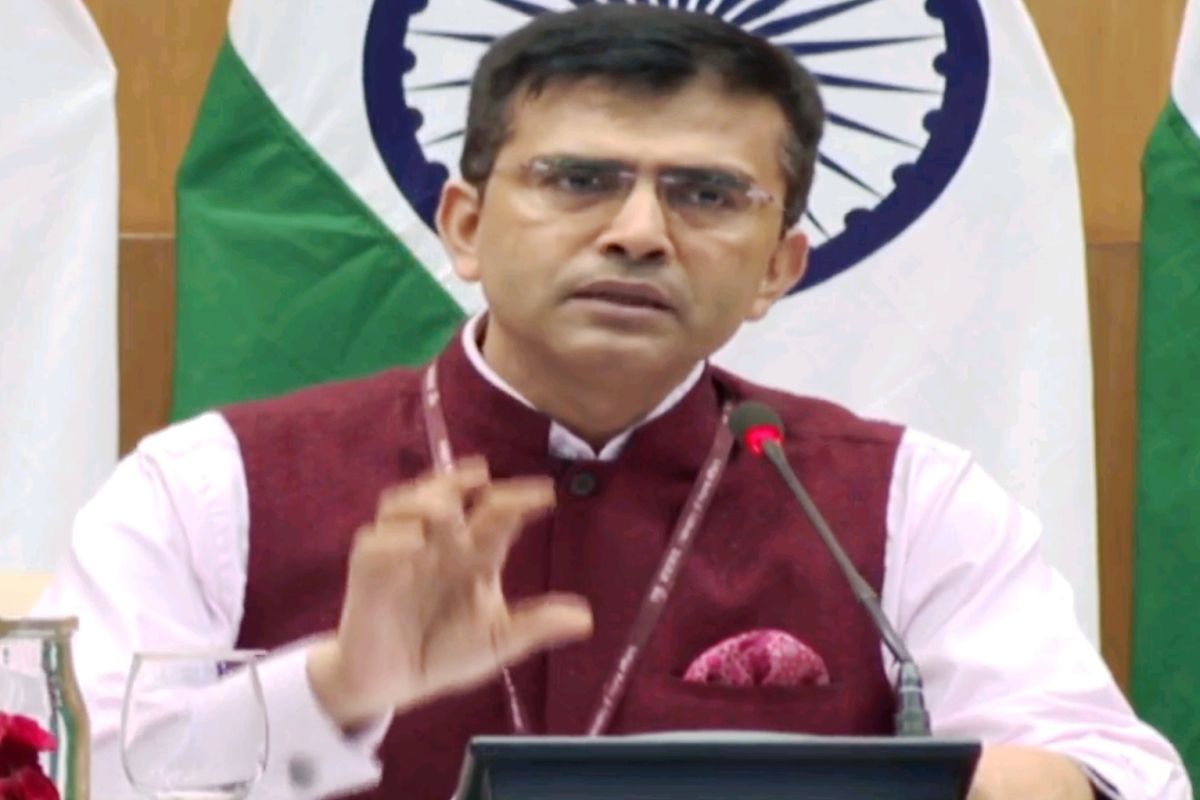LG Sinha offers refreshments to Muharram procession participants
On the solemn occasion of Youm-e-Ashura, the 10th day of Muharram on Sunday, Lieutenant Governor Manoj Sinha joined the Zuljinah procession at Botakadal, the downtown area of Srinagar.
External Affairs Ministry spokesperson Raveesh Kumar said essential supplies, including 24×7 electricity, water supply, healthcare and sanitation were being ensured.
Statesman News Service | New Delhi | September 12, 2019 10:20 pm

In an attempt to counter the ‘motivated’ campaign by a section of the international media on the situation in Jammu and Kashmir, the government on Thursday listed the steps it has taken to restore normalcy after restrictions were imposed there on 5 August following the abrogation of Article 370 of the Constitution.
Addressing a media briefing here, External Affairs Ministry spokesperson Raveesh Kumar said essential supplies, including 24×7 electricity, water supply, healthcare and sanitation were being ensured. Hospitals and medical facilities were functioning normal. There was no shortage of medicines. All 376 notified medicines and 62 essential medicines were available in adequate quantity.
Advertisement
He said essential medicines worth Rs. 32 crore (about $5 million) were received in J & K between 20 July – 23 August (more than average). Six weeks reserve of all medicines were available in all government hospitals. No case of over-pricing of medicines, essential supplies was found in more than 72 surprise checks. In Srinagar, 1165 out of 1666 chemist shops were open. In the Kashmir valley, 65 per cent of the 7630 retail chemists and 4331 wholesale chemists were open, Kumar said.
Advertisement
The spokesperson said 95 per cent of health care professionals were on duty. More than 4,00,000 patients have been attended to for various ailments in Outpatient Departments (OPDs) with 35,000 patients admitted and 11000 surgeries have been conducted since 5 August.
Banking and ATM facilities were operating normally and cash was regularly loaded so that the public do not face any difficulty, Kumar said. More than $14 million equivalent in Indian Rupees have been disbursed through J&K Bank ATMs alone.
He said 92 per cent of the areas of J & K have no restrictions. Earlier, restrictions had been imposed by the local administration in some parts to maintain law and order. Some day-time restrictions remain in only 11 of the total 199 police stations, he said.
The spokesperson said government offices have been made fully functional from 16 August. Some 20339 schools were open and classes were being conducted. Primary and middle reopened on 19 August and secondary schools reopened on 26 August. Examinations in Government Medical College, Srinagar were held from 5-12 September and 24 September -12 October.
Landline telephone communication has been restored. All telephone exchanges were operational. Mobile connectivity has been restored in 13 of the 22 districts. It included Kupwara and Handwara districts in Kashmir. Mobile connectivity was being restored in the remaining 9 districts gradually, keeping in mind the threat posed by terrorist organisations in using mobile connectivity to organise terror actions.
The spokesman said economic activity was being given a boost. Some 700,000 farmers in J&K grow 2.2 million metric ton of apples. This being the harvest season, the harvest of apple and other fruits and their transportation to market was facilitated. The government, he said, has launched a ‘Special Market Intervention Price Scheme’ for price support to the produce and would be procuring 1.2 million metric ton of apple, committing over $800 million, to support livelihood for these farmers.
Full focus was on returning the situation to normalcy, Kumar said. Some restrictions on communications and preventive detentions have been made, as per law, at local administration level based on the ground situation with a view to maintaining public law and order. These were being reviewed continuously and being eased based on the ground situation, he added.
Advertisement
On the solemn occasion of Youm-e-Ashura, the 10th day of Muharram on Sunday, Lieutenant Governor Manoj Sinha joined the Zuljinah procession at Botakadal, the downtown area of Srinagar.
The minister highlighted the government of India’s commitment to protecting farmers’ interests under the leadership of PM Narendra Modi.
“J&K will emerge as a key growth engine in India's journey from the fourth-largest to the largest global economy,” the minister was quoted as saying in an official press statement issued here.
Advertisement
